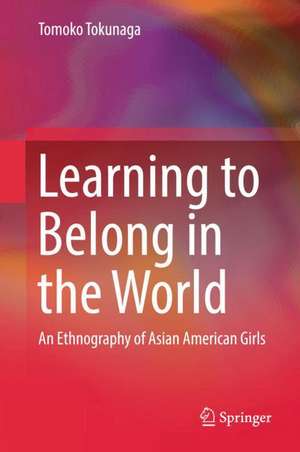Learning to Belong in the World: An Ethnography of Asian American Girls
Autor Tomoko Tokunagaen Limba Engleză Hardback – 27 mar 2018
| Toate formatele și edițiile | Preț | Express |
|---|---|---|
| Paperback (1) | 497.07 lei 39-44 zile | |
| Springer Nature Singapore – 9 feb 2019 | 497.07 lei 39-44 zile | |
| Hardback (1) | 685.08 lei 3-5 săpt. | |
| Springer Nature Singapore – 27 mar 2018 | 685.08 lei 3-5 săpt. |
Preț: 685.08 lei
Preț vechi: 805.98 lei
-15% Nou
Puncte Express: 1028
Preț estimativ în valută:
131.15€ • 134.88$ • 108.80£
131.15€ • 134.88$ • 108.80£
Carte disponibilă
Livrare economică 30 ianuarie-13 februarie
Preluare comenzi: 021 569.72.76
Specificații
ISBN-13: 9789811084782
ISBN-10: 9811084785
Pagini: 228
Ilustrații: XIII, 156 p. 5 illus.
Dimensiuni: 155 x 235 mm
Greutate: 0.42 kg
Ediția:1st ed. 2018
Editura: Springer Nature Singapore
Colecția Springer
Locul publicării:Singapore, Singapore
ISBN-10: 9811084785
Pagini: 228
Ilustrații: XIII, 156 p. 5 illus.
Dimensiuni: 155 x 235 mm
Greutate: 0.42 kg
Ediția:1st ed. 2018
Editura: Springer Nature Singapore
Colecția Springer
Locul publicării:Singapore, Singapore
Cuprins
Chapter 1 Introduction: Focusing on the experiences of Asian American girls.- Chapter 2 Searching for Belonging in-between homelands.- Chapter 3 Creating Ibasho in-between school walls.- Chapter 4 Fostering Belonging and Identity at a community-based organization.- Chapter 5 Forming Identity and Girlhood through consumer culture.- Chapter 6 Constructing imagined homes in the deterritorialized world.- Chapter 7 Lessons and messages from borderland dwellers.- Epilogue.
Recenzii
“It will be accessible reading for students in undergraduate and graduate classrooms and for anyone interested in learning about how Asian American girls’ daily experiences and agential practices shape their sense of belonging in the world. The book contributes significantly to an inter-disciplinary readership and pertinent for the fields of girlhood studies, gender studies, diaspora studies, children’s geographies and childhood studies, and overall, significant scholarship for those interested in children and youth cultures.” (Anandini Dar, Children's Geographies, January 29, 2020)
“This book is an important contribution to literature on second-generation immigrant children’s liminality, acculturation, and identity formation in transnational social spaces. The theoretical and practical implications drawn from this study may also be applied to Japanese society and education, which are now facing increased ethnic diversities with the influx of immigrants. The book is highly recommended to anyone interested in how society and education can support immigrant youths’ construction of ibasho and empowerment.” (Misako Nukaga, Educational Studies in Japan, Issue 13, March, 2019)
Notă biografică
Tomoko Tokunaga is a Project Assistant Professor at the International Center, Keio University in Tokyo. She received her Ph.D. in Educational Leadership and Policy Studies (specialization in Socio-cultural Foundations of Education) as a Fulbright Scholar from the University of Maryland, College Park, and her M.A. in Education from the University of Tokyo. Her research focuses on the impact of migration on immigrant youth and their potential roles in a globalized world. She has conducted longitudinal multi-sited ethnographic research with Filipina immigrant girls in Japan and Asian American girls in the United States, focusing on notions of agency, belonging, identity, and borderlands.
More recently, she has explored the possibilities of community engagement in empowering and supporting the creation of ibasho (places where one feels a sense of comfort, safety, and acceptance) for minority youth in Japan and the United States. She was awarded the 2013 Outstanding Dissertation Award from the American Educational Research Association (AERA) Special Interest Group: Research on the Education of Asian and Pacific Americans (REAPA), and the 2013 Presidential Early Career Fellowship from the Council on Anthropology and Education (CAE), a section of the American Anthropological Association (AAA). Her work has appeared in journals, including International Journal of Qualitative Studies in Education, Ethnography and Education, and Equity & Excellence in Education.
Textul de pe ultima copertă
This book provides a complex and intricate portrayal of Asian American high school girls – which has been an under-researched population – as cultural meditators, diasporic agents, and community builders who negotiate displacement and attachment in challenging worlds of the in-between. Based on two years of ethnographic fieldwork, Tomoko Tokunaga presents a portrait of the girls’ hardships, dilemmas, and dreams while growing up in an interconnected world. This book contributes a new understanding of the roles of immigrant children and youth as agents of globalization and sophisticated border-crossers who have the power and agency to construct belonging and identity across multiple contexts, spaces, times, activities, and relationships. It has much to offer to the construction of educative communities and spaces where immigrant youth, specifically immigrant girls, can thrive.
Caracteristici
Richly grounded in ethnographic data, it provides fundamental information on the identities and experiences of Asian American high school girls, an under-researched population Adopts an interdisciplinary, transcultural, and hybrid approach, using the “Western” concept of home and the “Japanese” concept of ibasho (a place of comfort, safety, and acceptance) to uncover sites of belonging Offers a new understanding of the roles of immigrant children and youth as agents of globalization and community builders who have the agency to construct belonging and identity Includes concrete suggestions and implications regarding how to develop effective programs and communities where immigrant youth can thrive
